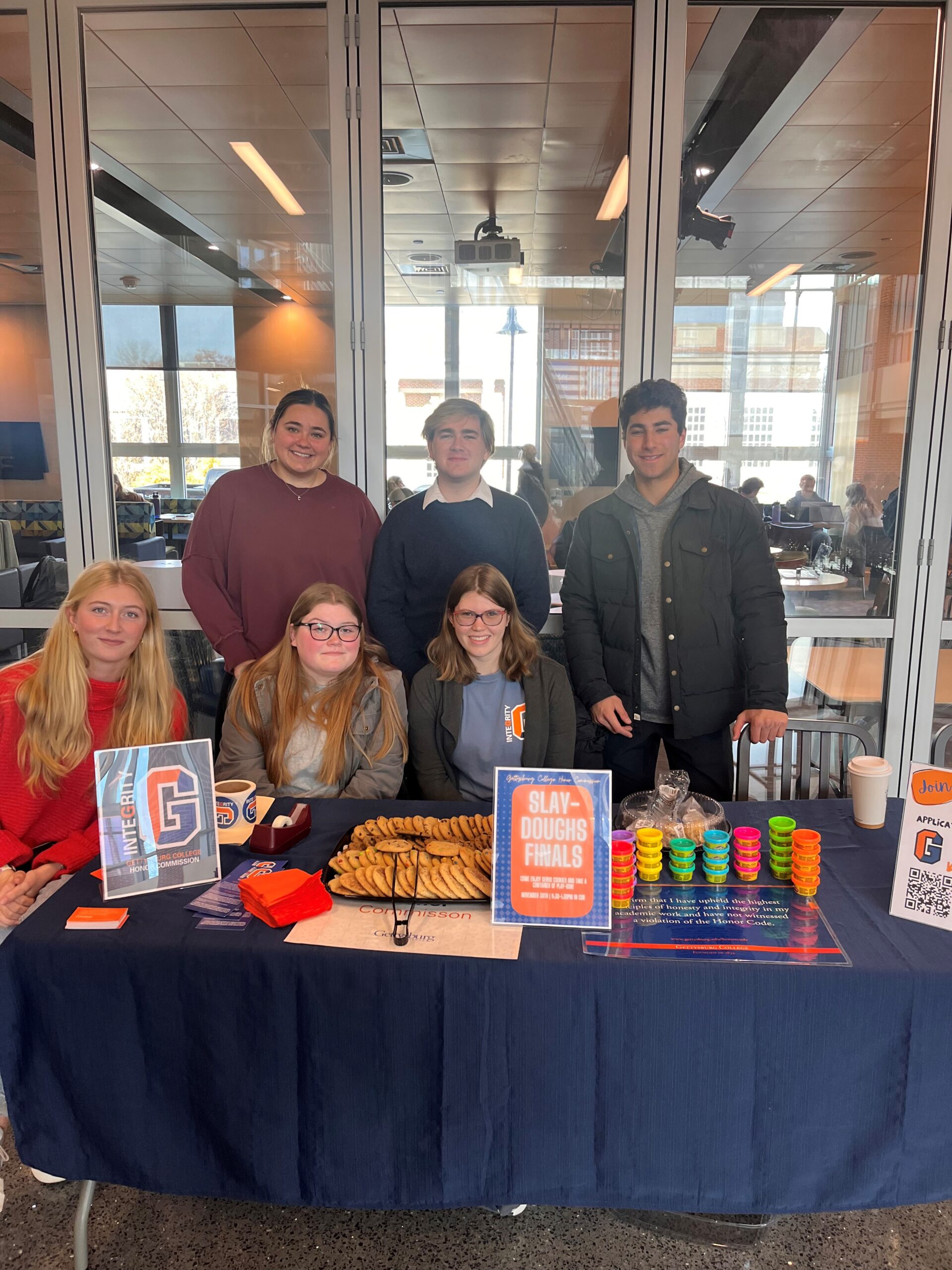By Katie Lauriello, Lead Copy Editor
For the past couple of months, the Gettysburg College Honor Commission has been evaluating the state of the Honor Code in light of technological developments and campus opinion. On Feb. 23, the Honor Commission released a survey to the greater campus community asking for student opinions on the current state of the Honor Code and Commission. With the help of this survey, as well as careful research into faculty opinion, the Honor Commission plans to update the Honor Code for the fall semester of 2024.
The Honor Commission also hosted Fritz Foltz ’59, a founding member of the Honor Code in 1957, for lunch on Feb. 26. According to Foltz, Nobel Prize winner Mike Bishop ’57 believed that students were responsible and mature enough to handle their own issues, so he and several other students took inspiration from the Naval Academy to establish the Honor Code and the Honor Commission.
Though over sixty years have passed since the beginning of the Honor Code, the underlying principles of accountability and individual responsibility remain the same.
Student Advisor to the Honor Commission Caroline Gill ’24 said, “Integrity is a core value in anything we do. Gettysburg College is an elite academic institution, and the Honor Code ensures that every student is held to the same expectations across the board. It ensures that students are fully engaged in the learning. It also creates an equal academic playing field, so students are getting the amount of credit they deserve. When used correctly and upheld by students and faculty, it promotes our sacred values of the college.”

The Honor Commission set up a table outside CUB for their “Slay-Dough Finals” on Nov. 30, where they gave free cookies and Play-Doh while spreading awareness about the Commission. (Photo Courtesy of Caroline Gill)
Associate Dean for the Center for Student Success and Honor Committee Advisor Hannah Sollenberger added, “We want students to have a way to say to themselves, ‘I don’t want to cheat because I want to be proud of the work that I do.’”
During the talk with Foltz, numerous issues were brought up that the Honor Commission is endeavoring to solve with their updates. One issue on their minds is addressing how generative AI and online cheating fits into the Honor Code.
Sollenberger believes that the mentality around keeping students and peers honest changed during the COVID-19 lockdowns, as professors shifted away from traditional grading methods into online exams that may have different allowances, such as the usage of a textbook or notes. Cheating began to “feel” different, according to Sollenberger, because looking at someone else’s exam in a classroom feels different from opening a new tab on Google during an exam.
This comes to a head when AI is introduced into the equation. Schollenberger pointed out that spell-check programs or the Discover tab on Microsoft Powerpoint may not feel wrong to use because they are part of commonly used computer programs, brushing off the use of AI in the software. Context also matters, according to Sollenberger. There is a difference between using grammar correction programs as opposed to ChatGPT.
“We can’t write one blanket AI policy because it’s going to be outdated by the time it’s ready and because context matters. It’s hard to put an exact definition to when using AI is a violation and when it is not,” said Schollenberger.
“I personally think AI is a great tool to help comprehension and begin the research process,” said Gill. “The challenge about it being able to let students know when they went too far, and when the AI has completed the assignment for them. If students use AI, we want them to know it is part of the learning process, not the learning process itself.”
Currently, the Honor Commission’s goal is to create a general rule that the allowance of AI should be left to the professors, since each professor in every department has their own idea of how to tackle AI.
Several professors, according to Gill, have also reported their desire to proctor their exams. Honor Commission member Andrew Lemon ’24 also noticed that many new professors want to be more involved in the exam process, while some older faculty would like for the proctoring system to remain as is. The Honor Commission is making it their goal to allow professors to choose whether they proctor or not rather than have to ask the Commission for permission, as they currently have to.
Gill has also proposed a new warning system to be created, where a faculty member will lead a student who has committed a minor violation of the Honor Code through a guide created by the Honor Commission. In the meeting, the two will discuss why the violation occurred, what made the act a violation and what the student’s next steps will be to change their behavior. Then, the paper will be signed by the Honor Commission Co-Chair, completely eliminating the need for a lengthy hearing that could take weeks or months to schedule.

“Popcorn Pops, Integrity Rocks” was hosted by the Honor Commission on Feb. 28 in the evening to bring people together to study during midterms while at the same time directing them to complete the Honor Code revisions survey. (Photo Courtesy of Caroline Gill)
Gill explained, “This works on conflict resolution skills and allows for professor and student to come to an agreement without the stresses of a conference or hearing board. I have done dozens of conferences in my time. Students are scared, and a lot of time these conferences take a long time to set up with different schedules. Sometimes students wait months for a tiny assignment that could be adjudicated in ten minutes.”
Student reporting has also become more difficult, not only because of technology. Lemon gave the example of group cheating, for instance, when a group of friends take an exam together in the back of a classroom. Even if only one member of a group cheats, the rest of the group are not likely to report them because of their friendship. Lemon and Gill also noted that it is extremely difficult for the Honor Commission to decide whether someone violated the Honor Code based on hearsay.
“I have had a lot of friends and other students tell me either directly or in the recent survey that it is not their job to police during an exam. It is distracting and when you have a set amount of time to do your own work, it is hard to worry about someone else,” Gill said.
In the recent survey, the Honor Commission asked students, “If you saw a student using their phone during an exam or quiz, what would you do?” According to the results, about 60% of students said they would either report it to their professor or use the Honor Code email, but about 40% said they would not report it at all. For these reasons, Gill is even more in favor of professors proctoring their own exams.
“I really admire the Honor Code. I think it’s something that makes us a really strong institution. It enhances the fabric of who we are as students, and that we can be trusted by our faculty members,” said Lemon. “If we are able to hold onto this Honor Code, which is a tradition that’s been here for a long time, we would be able to maintain a high standard.”
These proposals still have a long way to go. After the Honor Commission prepares their amendments, they must then be approved by the Student Senate, faculty and the Board of Trustees. Still, the Honor Commission hopes to release a proposal by the end of this semester so that the Class of 2028 can arrive in Gettysburg with an updated Honor Code.
This article originally appeared on pages 8 to 9 of the April 2024 edition of The Gettysburgian’s magazine.
